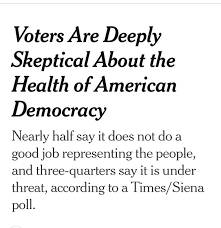Voters Are Deeply Skeptical About the Health of American Democracy
In recent years, the health of American democracy has come under intense scrutiny, with voters expressing deep skepticism about its resilience and functionality. This pervasive doubt reflects broader concerns regarding electoral integrity, political polarization, and the influence of money in politics. As we approach the upcoming elections, understanding the roots of this skepticism is crucial for addressing the challenges facing the democratic process.
One significant factor fueling voter skepticism is the perception of electoral integrity. High-profile incidents of alleged voter fraud, combined with the political rhetoric surrounding them, have cast a shadow over the legitimacy of elections. Many voters, particularly those from marginalized communities, report feeling disenfranchised and believe their votes carry less weight. The rise of strict voter ID laws and other voting restrictions in various states further exacerbates these feelings, leading to fears that democracy is becoming less inclusive.
Political polarization is another critical element contributing to the public’s disillusionment. The increasing divide between party ideologies has fostered an environment where compromise is often seen as weakness. This has resulted in a legislative gridlock that frustrates voters who feel their concerns are not being adequately addressed. According to recent surveys, a significant percentage of voters express concern that their representatives prioritize party loyalty over the needs of their constituents. This disconnect has bred cynicism about the efficacy of elected officials and the democratic process itself.
The influence of money in politics also plays a crucial role in shaping public perception. The 2010 Citizens United v. FEC ruling, which allowed for unlimited political spending by corporations and unions, has transformed the political landscape. Many voters believe that wealthy donors and special interest groups wield disproportionate power in shaping policy and influencing elections. This perception undermines trust in elected officials, as citizens often feel that their interests are secondary to those of affluent donors. As campaign finance becomes increasingly opaque, the belief that democracy is being auctioned off to the highest bidder continues to grow.
Moreover, the role of misinformation and disinformation in shaping public opinion cannot be overstated. The rapid spread of false information, especially on social media platforms, has led to widespread confusion about electoral processes and candidate qualifications. Voters are bombarded with conflicting narratives, making it difficult for them to discern truth from fiction. This environment not only erodes trust in traditional news sources but also in the democratic institutions designed to protect the electoral process.
Despite these challenges, there is a growing movement among citizens to reclaim the democratic narrative. Grassroots organizations are mobilizing to educate voters about their rights and the importance of participation in the electoral process. Initiatives aimed at increasing transparency in campaign financing and advocating for voting rights are gaining traction, as citizens recognize the need to hold their representatives accountable.
In conclusion, the skepticism surrounding the health of American democracy is multifaceted, rooted in concerns over electoral integrity, political polarization, the influence of money, and the spread of misinformation. As voters prepare for future elections, it is imperative that leaders address these issues head-on, fostering a political environment where trust can be rebuilt. Only through concerted efforts to engage and empower citizens can we hope to restore faith in the democratic process and ensure that it remains a true reflection of the will of the people.


